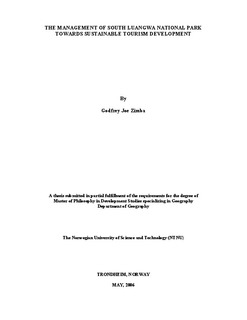| dc.description.abstract | This thesis explores communities’ participation and involvement in both wildlife-based and tourist activities in south Luangwa national park with particular focus on local participation/ devolution. Specifically, it assesses whether the legal provisions for community participation in wildlife management spelt out in the wildlife policy take into account various factors which enhances the effectiveness of local participation in CBNRM. It then examines various forms of community participation in wildlife management and small scale tourism activities. Finally, the study examines sources of conflict which may occur over natural resources in SLNP and adjacent GMA.
The study uses political ecology and protected area management paradigm as the theoretical frameworks. The former comprises four major elements, which include the politicization of the environment, a focus on actors as the contestants in this politicization, inequality in distribution of power between and among actors in the park, and the dynamic involvement of natural environment in this process. The latter, uses a CBC framework that is based on: allowing people living near the protected lands to participate in land-use policy and management decisions; giving people proprietorship or ownership over wildlife resources; and, giving local people economic benefit from wildlife conservation. A case study approach is adopted involving qualitative research method. Data were collected through personal observation, formal and informal interviews, focus groups and document review. In a case study approach, an empirical inquiry, which investigates contemporary phenomenon within its real-life context such like wildlife, is analyzed and interpreted through the selected theoretical frameworks.
The data reveal that, local people living near SLNP and in the Lupande GMA do not per se actively participate in land-use policy and management decisions. Further, data indicate that community resource boards in the three chiefdoms have not been given ownership over wildlife resources. ZAWA has continued appropriating all the revenues accruing from wildlife utilization in the area since its inception. This is contrary to what is stated in the wildlife policy and wildlife Act 1998. Also, data shows that many local people do not individually benefit from wildlife-based and tourist activities. Additionally, data indicates that different interest groups expect different types of participation to achieve their own goals. Accordingly, participation varied among various interest groups although much of it as reported by respondents concentrated in the two lower levels of Pretty’ typology. The findings are significant because they offer a framework for understanding challenges and conflicts related to wildlife conservation and tourism development. | nb_NO |
